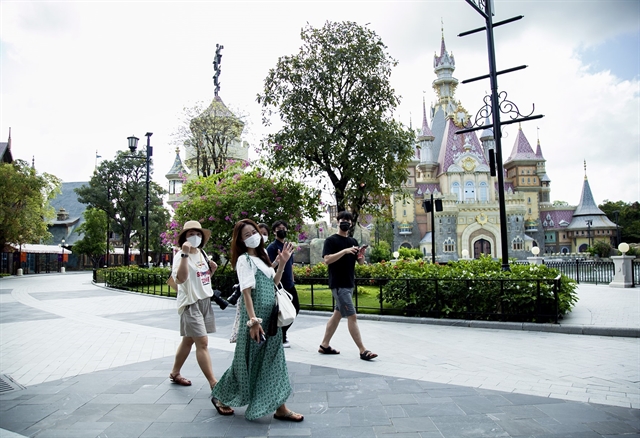 Society
Society


|
| A group of tourists visit Phú Quốc in Kiên Giang Province. Officials said promoting domestic travel was key to recover the tourism industry. VNA/VNS Photo Hồng Đạt |
NGHỆ AN — Experts have said Việt Nam needs a roadmap to recover the tourism sector which has been devastated by the COVID-19 pandemic.
As part of the plan, emphasis should be placed on promoting domestic travel, preferential tax and loan policies for businesses as well as human resources training. Officials and travel companies made the recommendations at a conference on tourism in the central province of Nghệ An on Saturday.
Deputy Prime Minister Vũ Đức Đam said Việt Nam should promote domestic travel, develop community-based tourism as well as digitalise the cultural tourism resources.
“Major companies and localities should cooperate and promote investment to help local people develop community-based tourism,” he said.
He added that this would not only bring economic benefits but also help to bring development to remote areas.
He said Việt Nam should not be rushing with opening tourism to international arrivals but need a road map with specific steps.
“It’s necessary to have very good preparations before opening the tourism sector. To do so, we have to administer booster shots in a rapid way as well as have sufficient medicine and health workers in cases tourists are infected,” the Deputy Prime Minister said.
Ministry of Health statistics showed that more than 144.5 million doses of COVID-19 vaccines have been administered in the country, of which nearly 65.4 million people have been vaccinated with two doses and approximately 2.3 million inoculated with three doses as of December 24.
The Tourism Conference 2021, themed “Việt Nam’s Tourism, Recovery and Development”, was held in the central province of Nghệ An on Saturday to discuss ways to accelerate the industry’s recovery and growth.
The conference was held by the National Assembly’s Culture and Education Committee, Ministry of Culture, Sports and Tourism and Nghệ An Province.
A total of 19 key provinces and cities in tourism also joined the conference via video conference.
Nguyễn Đắc Vinh, Head of the 15th NA's Culture and Education Committee, said Việt Nam’s tourism encountered unprecedented challenges in the last two years due to the COVID pandemic with tourism markets and activities having been disrupted and suspended.
“The conference will provide an overall picture on the status of the world’s and Việt Nam’s tourism under the impacts of the pandemic,” he said.
The event would provide proposals for the National Assembly and the Government to have prompt solutions to help tackle the challenges and have policies to recover and develop tourism, an important area with great effects in recovery post-pandemic, he said.
Deputy Minister of Culture, Sports and Tourism Đoàn Văn Việt said the pandemic had changed the lifestyle and demands of people. Potential travel trends post-pandemic might include safe destinations, services that can minimise contacts, tours in small groups over a short period of time, and resort nature-based services.
He said it was necessary to understand the trends and flexibly adapt to them as well as have several policies to recover and develop tourism in a new context.
It was important to continue supporting businesses and employees in the tourism sector with incentives such as tax reduction and exemptions, human resources training as well as digitalisation and technology development.
Many countries had adopted policies and measures to reopen their doors to foreign visitors and revive tourism, and this prompted Việt Nam to keep up with this trend and not waste time, Vice Chairman of the National Assembly Trần Thanh Mẫn said.
Mẫn highlighted the importance of tourism in each country’s socio-economic development strategy.
In Việt Nam, the industry generated some US$32.8 billion in revenue in 2019, or 9.2 per cent of the national GDP, and created around 2.5 million jobs.
The sector had remained on hold because of COVID-19, with most firms closed down or suspending operations, leaving a large number of workers jobless, he said.
Mẫn said it was crucial to have a comprehensive assessment of the impacts of COVID-19 on tourism and the industry’s current status and future outlook which would lay a basis for making recommendations and proposing solutions for reviving tourism in the future.
Recovery solutions must focus on improving Việt Nam’s tourism competitiveness and bring its potential and advantages into full play to create distinctive, culturally and historically rich products and brands, he noted, adding that they must also take into account conservation of cultural heritage, protection of the environment and natural landscapes, and sustainable tourism development, he said.
Nguyễn Quốc Kỳ, chairman of Vietravel, suggested the Government have specific policies on repayment terms and loan interest for the tourism sector as well as implement tourism initiatives to recover the domestic market and attract international tourists.
According to the General Statistics Office, the total number of international visitors to Việt Nam in 2020 reached only 3.8 million, down 78.7 per cent year-on-year. Among them, more than 96 per cent were of the first quarter, the rest were mostly foreign experts and employees working in Việt Nam. VNS




